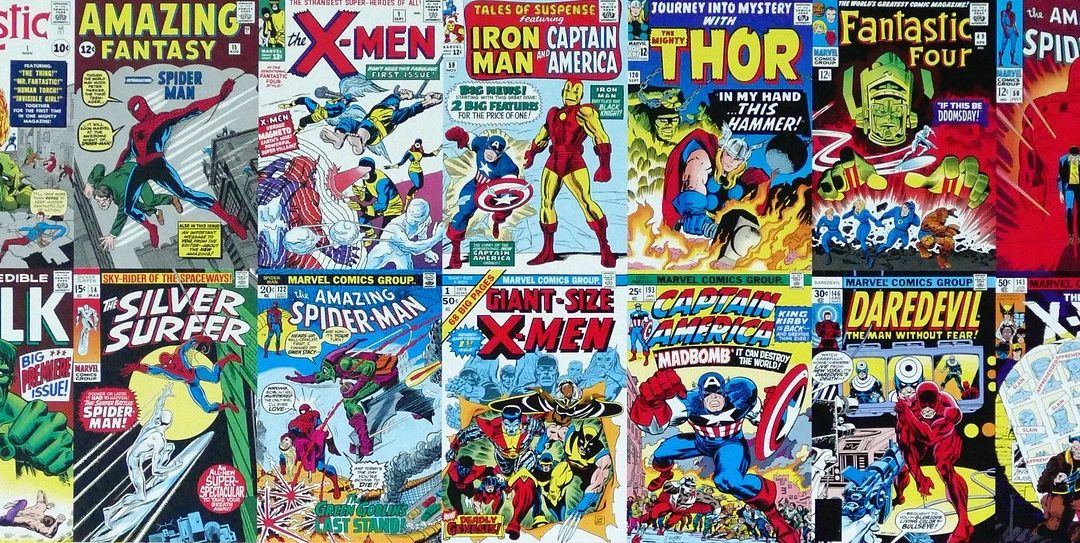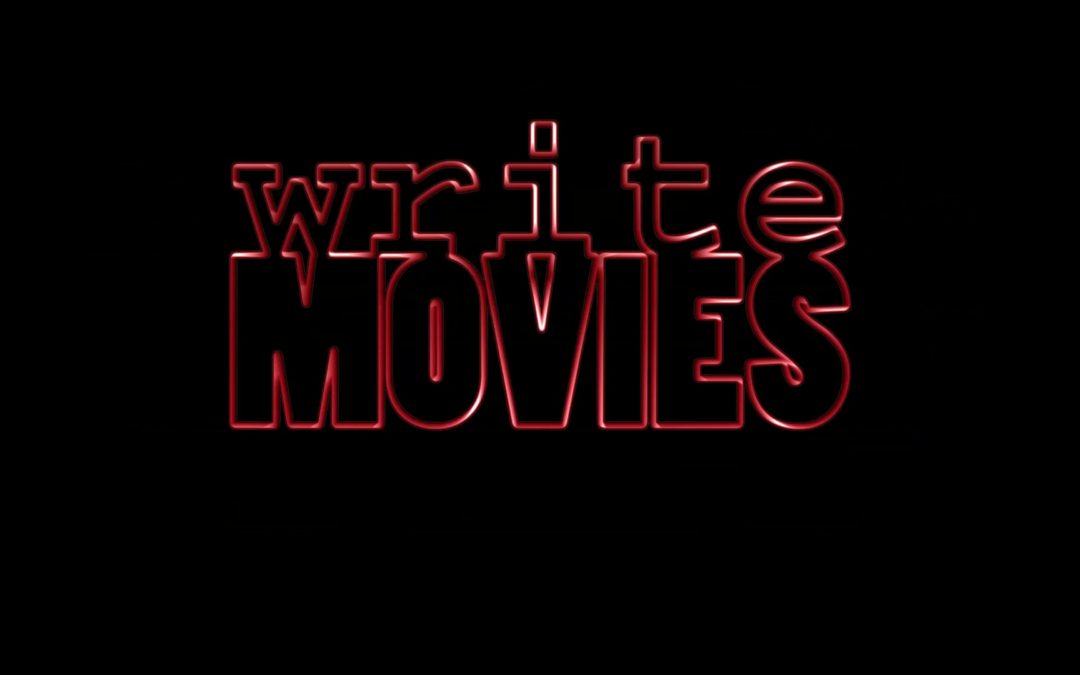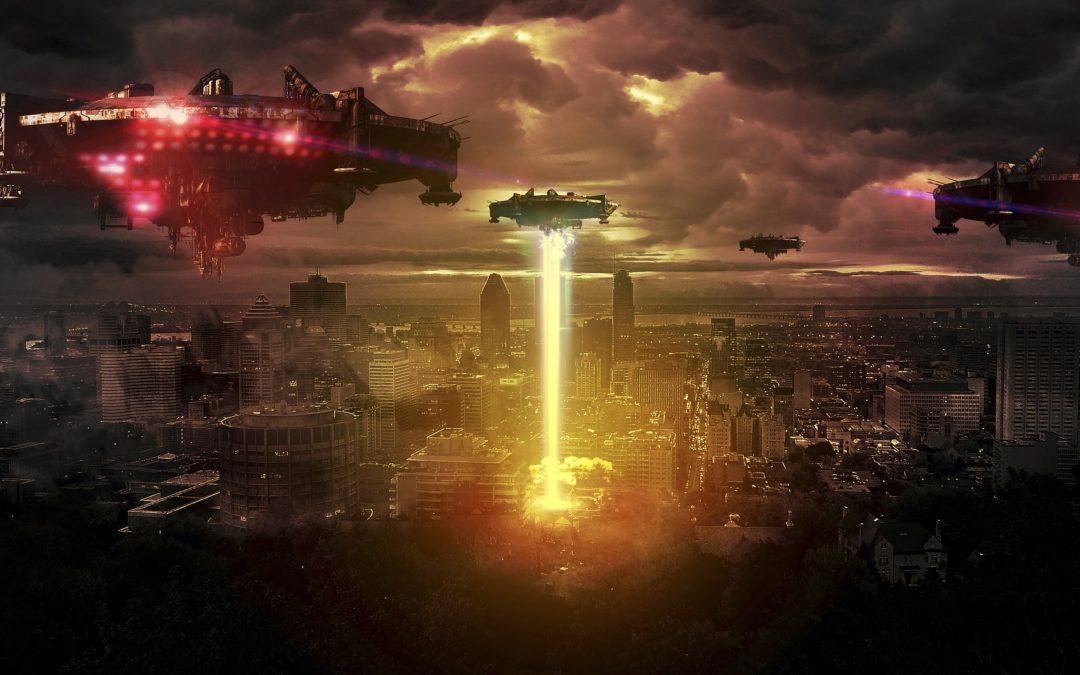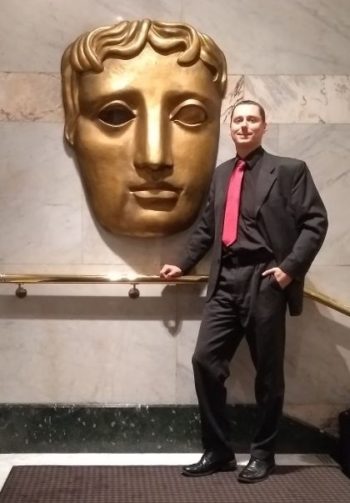
by John | Nov 16, 2018 | Ian Kennedy, Industry News, WriteMovies News
WriteMovies Director Ian Kennedy explores the works of Stan Lee and why superhero stories unleash our imaginations better than any other kind of stories…
At the heart of every superhero story is a central question that fires our imaginations every time, and nobody took it further than Stan Lee. The extraordinary array of well-known characters he brought into the world, which return again and again across many formats and platforms, is testament to that.
Cosmic stories like the creation of the universe are just too big to really relate to as stories, at least in the scientific telling – but many mythologies and religions make these stories relatable by ascribing these vast events to recognisably humanized figures. Gods like Zeus/Jupiter and Odin/Woden are presented like more powerful versions of human beings, able to shape the world with their powers and the sometimes arbitrary logic of their choices and lives; ancient heroes like Hercules and Beowulf are humans but given extra powers or significance. Superhero stories are clearly following in this tradition – and grasp towards almighty powers at times (DOCTOR STRANGE, CAPTAIN MARVEL, The Phoenix in X-Men).
By bringing these forces down (or up – SPIDER-MAN!) to our scale, we get to explore how people like us would act if they were capable of so much more than we are. It’s no coincidence that the modern superhero genre and many of its biggest characters have their origins in the Great Depression – when ordinary people were powerless against global economic forces. The flimsy justifications that the storytellers find for giving these figures their powers, are really just an excuse to let our imaginations run riot, and are quickly delivered and forgotten about in most of the origin stories, so that we can get onto the fun and exciting bit.
Nobody grasped the potential of these stories more, or took them further, than Stan Lee and the teams of writers and illustrators and filmmakers who he has worked with – the list of now-famous characters he created is vast. But at the heart of all these stories is just one very powerful central question, which is deceptively simple but really fires our imaginations. “What would you do if you could…?”
Superheroes and supervillains both play out these powers and their potentials and hazards throughout every story. Here are some of our favorites at WriteMovies from Stan Lee’s creations.
If you could… move and sling webs like a spider!
On the one hand, Peter Parker is just an ordinary teenager, worried about the same kind of things as any other teenager – on the other, he finds himself equipped with the awesome powers that make him SPIDER-MAN. We can all relate to his troubles at school while rooting for him to become a true superhero as he learns an important lesson: “with great power comes great responsibility”.
If you could… fly around in an armored suit!
IRON MAN’s Tony Stark is basically another Bruce Wayne, but with much quirkier personality. As an outright arms manufacturer, he’s also more morally compromised than Wayne. While Wayne has an orphan sob-story, Stark has an ego. And unleashing an ego that size, on a suit that powerful, creates excellent conflict throughout – so much so that in CAPTAIN AMERICA: CIVIL WAR, he can fight against many of our other heroes, without losing our empathy.
If you could… use you other senses to fight despite being blind!
DAREDEVIL has found immense success on Netflix, and with good reason. Matt Murdock is a deep, conflicted character, living in a world of darkness after being blinded as a child. With his other senses heightened, the Devil of Hell’s Kitchen is so captivating because he doesn’t just overcome his physical disability but turns it into a strength, proving that anyone – even someone who is blind – can become a superhero.
If you could… shrink to the size of an ant!
Scott Lang may be a former criminal, but his desire to reform himself makes us support him all the same. As ANT-MAN, he proves that even the smallest person can make a huge difference – and all while showing us a crazy world around us too small for us to even see!
Stan Lee has given us plenty of amazing creations over the years, and the world is a lesser place without him. Take a look too at our thoughts on two films based on his other superheroes, THOR: RAGNAROK and BLACK PANTHER!

by John | Nov 9, 2018 | Writing Insights
Video games are a massive market for writers to explore: the recent RED DEAD REDEMPTION 2 made £725 million in its first weekend and shipped 17 million copies in two weeks – the largest opening weekend in the history of entertainment! If you want to get into this market as a writer, this article is for you…
Video games might be lucrative, but it’s not always easy to figure out all the terminology means. If you don’t know the difference between an FPS and an RPG, or an emote and a cutscene… Well, you certainly wouldn’t be the first!
That’s why Mark Brendan, our Elite Consultant for video game writing, is here to help. Mark has put together a handy guide for anyone who wants to get involved in writing for this new medium that cuts through the confusion and explains what all the terminology means…
Game Genre Terminology
RTS = Real-time Strategy
Normally top down view, often wargaming, but could be running a power station or theme park. Involves managing resources in real time to achieve a goal.
Command and Conquer, Total War series
FPS = First Person Shooter
An extremely popular style of game where the perspective is first person, as if through the eyes of the ingame character. Sometimes nothing of the character is visible, on other occasions hands with weapons are visible and the player can see some of their body when they look down, or press to interact with ingame objects. Shooter refers to the style of the game play – the gaminig is predominantly fighting with ranged weaponry.
Call of Duty, Bioshock, Half-Life
RPG = Role-playing Game
While the FPS is predominantly concerned with fast-paced action, an RPG takes longer to unfold. There are likely to be action sequences, often combat, sometimes challenges such as climbing. The player will gnerally be required to have much more of a relationship with the ingame world than in an FPS. To advance the player will need to talk to NPCs (Non-Player Characters), find and use objects, and solve puzzles to advance. While an FPS often makes the main character invisible, most modern RPGs allow extensive modification of the player’s character to customize it to their own preferences.
Fallout 3, Oblivion, Mass Effect
Third Person
In a third person game the player can see the character they are playing onscreen. The action is viewed as if from behind the character’s shoulder.
Prince of Persia, Uncharted, Tomb Raider
MMO – Massively Multiplayer Online
An online game that involves many people accessing the same game world at the same time.
World of Warcraft, Guild Wars
Narrative Terms
Cutscene
A cutscene is a non-interactive section of a game. This is generally used to tell story and to set up the key gameplay points for the next level i.e. Get to that bridge!
Scripted Event
A scripted event is an interactive cutscene. Here the player retains control while an event they don’t control such as a building collapsing, a plane flying by, or someone appearing on a balcony takes place.
Ingame/Level dialogue/Barks
This is dialogue that happens during the interactive sequences. The player will retain control as they hear pedestrians talking as they walk by, enemy soldiers calling orders, or companions calling warnings.
Emotes
Emotes are sounds rather than words such as a scream, a grunt, the effort sound of lifting; these are emotes rather than lines.
Player Activated Dialogue
Dialogue which the player triggers themselves by pressing to interact with characters in the game.
Ingame Terms
Player Character
As the title infers, this is the character the player controls. There can be numerous player characters in the game and the ‘character’ can lack many of the key things that define a character in other fiction (backstory, personality, etc.)
NPC = Non-Player Character
A non-player character is one that the player does not control. They could be an enemy, an ally, or neutral in terms of their approach to the player character.
With any luck, you’ve now got a better grasp of the gaming terminology a writer needs. If you really want to take your writing to the next level, we’d recommend get Elite Mentoring from Mark Brendan himself!
Take a look at Jamie White’s thoughts on writing for video games too in this article, where there are plenty more hints and tips to be found!
This is a great time to be getting involved in writing for video games; WriteMovies is still looking for scripts for both films and games to be directed by 2x BAFTA winner and 2x Oscar nominee Habib Zargarpour, too, which can be submitted to our Winter 2019 Contest.

by John | Nov 8, 2018 | Francais, WMC
C’est la rentrée les amis ! Le soleil brille encore et encore sur certaines contrées, et enflamme toujours l’imaginations fertile de nos auteurs préférés, autour du monde. Mais voilà qu’au loin se profile déjà un prochain Concours, et l’hiver naissant. Les chapkas vont remplacer les panchos, il est temps de se mettre au travail!
Vous pouvez d’ores et déjà nous envoyer vos textes, et ce jusqu’au 13 Janvier. Savez-vous que depuis longtemps nous faisons le pont entre les auteurs francophones et l’industrie cinématographique mondiale ? Nous offrons un accès total à nos compétitions internationales, et à nos services d’analyse et d’évaluation. Nos services, analyses évaluations sont de la même qualité et du même format que les plus grands studios de production internationaux. Entre autres choses, nous présenterons les scripts gagnants à nos contacts les plus haut placés dans l’industrie cinématographique pour vous et les gagnants recevront 2500$ USD ainsi qu’un développent de script gratuit (valeur 3200$ USD!). Alors foncez!
Si vous avez des questions, vous pouvez m’envoyer ça en privé : auteur@writemovies.com

by John | Nov 6, 2018 | Industry News, Movie Reviews and TV Reviews
There are plenty of things that make us wax rhapsodic about a script: an exciting story, engaging characters, dialogue that jumps off the page… But we also look at a screenplay’s commercial aspects, such as its budget and chances at the box office.
That’s why it’s always important for a writer to always keep a finger on the industry’s pulse. Figuring out what sells and what doesn’t is vital if you want to be successful as a screenwriter, and right now, what’s selling is BOHEMIAN RHAPSODY.
The Queen biopic may have had a turbulent time behind the scenes, but that hasn’t affected its success. Variety reports that the film has taken a massive $72 million internationally in addition to $50 million domestically, adding up to a tremendous $122.5 million. For a film that cost $52 million to make, that’s a major success.
Our own Ian Kennedy has seen the film already. His verdict? “To my surprise, that hit all the right notes for me. Impressive screenwriting and musical concision, to balance everything they did, acknowledge the untold, and keep a PG-13 rating.”
Musical dramas have already enjoyed success this year with A STAR IS BORN being a critical and commercial success, and being eyed by many as a potential contender at the Academy Awards. Of course, this isn’t the only genre succeeding at the box office right now – but by paying close attention to these kind of things, we know what to look for when judging scripts for our competition.
It’s also interesting to note that BOHEMIAN RHAPSODY has achieved huge success at the box office despite its mixed critical reception, with a Rotten Tomatoes score of 60%. Much like the MAMMA MIA films, there’s more to success than just what the critics say!
We’re currently nearing the end of Standard Entry for our Winter 2019 Screenwriting Contest, from just $39 until this Sunday, 11th November. Don’t forget we’re also looking for scripts to be directed by 2x BAFTA winner and 2x Oscar nominee Habib Zargarpour, too – an opportunity not to be missed!
Click here to enter!

by John | Oct 29, 2018 | Success Stories, Updates, WriteMovies News
We’ve been hard at work lately having pitching scripts to industry, having pitch meetings with producers and distributors about our many projects! Alex and Ian had a productive meeting at BAFTA recently, discussing the slate and future opportunities. So, what have we been up to? Let’s take a look…
We’ve also recently had pitch meetings with many companies including Film4 and several of our winners’ projects have been going from strength to strength!
We guarantee pitching to industry for the top three scripts from our competition – so enter our Winter 2019 Screenwriting Contest today from just $44, and you can follow in the footsteps of our past winners and get your script out there!

by John | Oct 26, 2018 | Industry News, Updates
Script Sales from September 2018
Script Pipeline have been reporting on script sales from September 2018 – and although sales might be light this month, there are some interesting projects to take note of.
- Halle Berry will be taking on her directorial debut with BRUISED, in which she will also star. We’ve had countless boxing movies over the years, but apart from WARRIOR, Mixed Martial Arts hasn’t yet had its day at the movies. Perhaps now is the time for it to step into the ring?
- THE WILD BUNCH is getting a remake, and it looks like Mel Gibson will be the man behind it. This will be his first feature since 2016’s HACKSAW RIDGE – and shows the continuing trend of remakes and reboots in Hollywood right now.
- Whatever you thought of Rian Johnson’s efforts with STAR WARS, he’s soldiering on with his next picture. KNIVES OUT is a modern murder-mystery with Daniel Craig, Chris Evans, and, as most recently reported by Variety, Jamie Lee Curtis.
Don’t forget, knowing what’s selling right now is important for any writer who wants the best chance of getting their work produced – so read the full report on script sales from September 2018 by clicking here.
And don’t waste the chance to get our professional feedback on your work either using our script report services. They’re discounted throughout our Winter 2019 Contest, and you get free entry to the competition when you commission one, too!

by John | Oct 22, 2018 | Updates
In readiness for the eventual arrival of the final season, Ian Kennedy subjects himself to the whole thing again. Can anyone endure Ned’s honor, Stannis, the Red Wedding, and – worst of all – Arya’s unending journey from ‘annoying’ to ‘a different kind of annoying’, all over again? Or will the quality of the writing conquer all foes once more? Spoiler central here, if you hadn’t guessed… but in euphemisms that would make Tyrion blush, most of the time.
In honor of Tyrion, it’s hard not to open a bottle of red wine. There will be much hardship ahead to endure. Especially with an hour of reintroductions to get through first.
Now, when I tell you that one of the main characters of a story will be a dwarf, you already know it’s in one of two genres. Which is crazy, since people of that stature can turn up in any other context. Why are you already assuming the story I’m talking about must be a fantasy or comedy? But, such is the power of genre expectations. Or maybe stereotypes.
So yes, Thrones is a fantasy – though the society it reveals plays out like a twisted version of medieval Europe, it has some important extra elements, like ‘bloodmagic’. And, by giving us a character who people could describe as a dwarf (he’s usually given other epithets instead, like Imp and Half-Man), it’s meeting some of our expectations of the fantasy genre. But it’s what the series does with tropes like this which is fascinating. Sure, we’re used to dwarf warriors in Lord of the Rings and dwarf magicians in Harry Potter… I could go on. But how about an alcoholic, wise, witty, rich, womanising one? That’s an individual, not a stereotype. Very quickly, we learn to view Tyrion as an individual – a person, not a type. The result is some powerful stereotype-busting – I’d been told to expect to spot his American accent in the early episodes, but I didn’t, reaffirming my conviction that Peter Dinklage is just a great actor, end of.

Hadrian’s Wall – not quite as big as the one in Game of Thrones…
Anyway, to the series itself. The first sequence, a Night’s Watch foray beyond the Wall, quickly establishes that it’s grim up North, and even worse North of the Wall. (Speaking of which, anyone else think the geography of Westeros in that vast title sequence is just an exaggerated map of medieval Britain, with the Wall standing for Hadrian’s Wall, Winterfell for York (Viking capital of the Danelaw), King’s Landing as London, etc? Sensibly, and vividly, we’re introduced to the series’ monstrous zombies straight away; if the White Walkers were introduced later, it’d feel like a cheap trick to heighten the stakes. Introducing them here – and then saying they haven’t been seen for thousands of years – shows that from the outset, the world of all these characters has taken a decisive change that puts everything in danger. If anything, the rise of the White Walkers across the coming series is too slow and occasional in the show, but we have plenty else to keep us occupied till they finally get to flex their muscles.
Next we’re introduced to the Starks, the family who are initially at the heart of the series, executing their usual dourly dutiful natures from the start, when patriarch Ned executes the deserter who escaped the White Walker before – not much of a reward for surviving the opening sequence, and a tough introduction to the character who is the moral heart of the coming episodes, but this sequence is intended to show the brutal justice of the world we’re entering: even the good guys accept their part in that. “The man who passes the sentence should swing the sword”, Ned tells Bran, his 10-year old son, who he forces to watch the execution. Next, more casual gore and death, as the Starks then discover a dead direwolf, resulting in her brood of orphan cubs being given to the Stark children – a nice motif established for later, when they will come to be closely associated with their adult direwolves (though, as in other respects, they are unsentimentally handled within the story from an early stage – one is already unjustly killed within a few episodes).
In King’s Landing, we briefly meet Lannisters Cersei and her brother Jaime discussing the suspiciously-deceased ‘Hand of the King’, but this is just setup for the arrival of the King – Robert Baratheon – to Winterfell, where he will ask his old pal Ned to take over as ‘Hand’ in the capital. Ned’s been avoiding King’s Landing for 9 years – and probably since his best friend Robert took the throne – and I’m keen to explore my theory that if Ned had accepted or taken the throne back when he and Robert deposed the ‘Mad King’, all of the turmoil and decimation we see in the series might have been avoided. Now, Robert (hardly as good as king as he was as soldier) tells Ned to rule so that he can continue to drink and whore himself to an early grave.
Another character on the same track is Cersei and Jaime’s undersized brother Tyrion. We’re used to seeing dwarves in this genre – but not as playboys. With Tyrion we meet the first naked woman of the series – must be some kind of distinction – and the next follows moments later when we meet Daenerys, a vital powerful character, yet who is stripped naked in her very first scene as her brother (the heir of the previous, murdered king of Westeros) readies her for a strategic marriage to a ‘savage’ king across the English Channel (sorry, Narrow Sea). Game of Thrones likes to get its women naked first, and give them their dignity later. Dany’s brother renders this starkly (no pun intended – oh, who am I kidding), stating that he’d let the entire Dothraki army and their horses violate her in order for him to return to Westeros as king. She is powerless at this point is – sorry, I’m trying to avoid saying ‘stark’ again – and this sets up her journey to the top well by placing her firmly in the opposite situation and ensuring that she is the person within this savage realm who we empathize with from the start.
Back in Winterfell, Jon Snow trains to go to the Wall rather than join the revels, proving that in spite of his ‘bastard’ origins, he’s inherited the Starks’ sense of duty and honor, and Tyrion tells him in solidarity that ‘dwarves are all bastards in their father’s eyes’ too. Ned gets news that the last Hand may have been murdered by the Lannisters, amplifying his dilemma about Robert’s request.
Dany’s wedding goes to plan, in that being stripped again and subjected by her new husband was definitely part of the plan, from the men’s point of view. Her reward is that she is presented with dragon’s eggs, which are thought to be petrified but will nonetheless come to define her later. All in all I’m impressed with the amount of information and motifs that are embedded in the first episode – as ever, the series juggles a big cast of characters while giving you just enough to recognize them all by. (See my Mini-Masterclass with the Game of Thrones personal identities challenge, to find out how this works.)
Finally, Bran stumbles upon a scene of you-know-what between siblings Cersei and Jaime (a queen, no less, shown robbed of her dignity, clothes and honor this time), bringing about Bran’s fateful accident. Finally we have a moment of action, and a good surprise plot twist to explain the rest of the intrigues we’ve discovered in the episode. This is also the first moment of action since the first sequence, just when I was just thinking this must be the only episode where none of the main characters have any.
The binding agent, the central question, that joins all the characters and storylines in THRONES is ‘who rules Westeros’. We’re not following the farmers or hilltribes. The series knows its central question, and sticks to it throughout, in spite of the huge cast, and never falls more than one or two removes away.
All in all, I wasn’t totally hooked by this episode second time round, but I felt the same about the first Harry Potter movie, even though both do a great job of introducing the fantasy worlds of their stories. Once you’re beyond that world-building, HP1 doesn’t have much more to offer you – but with its pincer-like moments of dialogue and brutalism, GoT’s first episode still does.
Playback rating: 4/5









